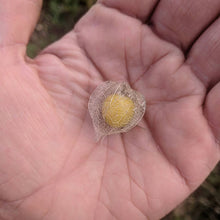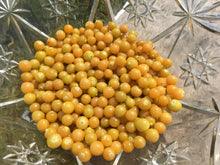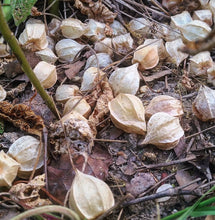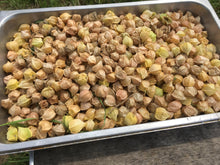'New Hanover' Ground Cherry
Regular price
$4.00
Sale
Physalis spp. (probably P. pruinosa)
Origin: New Hanover, Pennsylvania
Improvement status: Cultivar
Seeds per packet: ~50
Germination tested 10/2024: 83%
Life cycle: Annual
Ground cherries are close relatives of tomatillos, considered a type of "husk tomato." The flavor is often more tangy than sweet, and can taste more like a vegetable than a fruit, but not the 'New Hanover': it's sweet, fruity, and addictive. It can be hard to save seeds from these because you'll want to eat every fruit! At a tasting held by the American Institute of Wine and Food, it beat all other ground cherries tested. Try them in jams, jellies, sauces, pies or other baked goods, and they're also good raw or dried. The berries grow in profusion on upright, sprawling, drought-resistant plants, but the fruit are not worth eating until they've hit the ground (hence the name).
But as wonderful as this plant is itself, the story of the 'New Hanover' ground cherry makes it even more special. You should pull up a chair though... this is a long one...:
'New Hanover' is one of the first varieties we ever sold. We were given the seeds by William Woys Weaver, famed author and seed saver, steward of the Roughwood Seed Collection, and a founding board member of EFN. Will initially told us that the seeds came from the late Katie Hoffman Slonaker (1903-1983) of New Hanover, Pennsylvania, so that's about the only information we wrote in our description of the variety.
A few years later, I (this is Nate) was talking with Will at Roughwood, and we were marveling at how popular this variety was becoming. Will mentioned that he'd like to honor the young man who gave him the seeds by at least telling his story in the description. It turned out Will actually received the seeds from Katie Hoffman Slonaker's grandson. Back in the "80s or 90s", Jonas Slonaker managed the garden at Roughwood. Will remembered him as a hard worker and a kind soul who would, as he worked, sing the religious hymns of his conservative Pennsylvania Dutch childhood — but with hilarious and often lewd lyrics in place of the originals (little did I know then, I would eventually get to hear some of those lyrics). Will told us that Jonas quit one day and soon moved "out west", never to be heard from again.
The next day while revising some of our seed descriptions, I googled Jonas Slonaker. In no time I learned that a character in The Laramie Project — the famous play by the Tectonic Theater Project about the murder and torture of Matthew Shepard and the town where that horrible hate-crime took place — was called Jonas Slonaker. I soon learned that Jonas (like all of the "characters" in the play) was a very real person, and all of the biographical details I could find matched what I knew about Will's long-lost gardener: a middle-aged gay man, from a deeply conservative Pennsylvania Dutch community, "gone West" for personal healing in wide-open spaces. Jonas was inspired to come out of the closet after the murder of Matthew Shepard, a young gay man whom he had never met, and interviews with Jonas form some of the emotional core of the play. As it turned out, Jonas Slonaker was living in Laramie and working at the University of Wyoming!
A few months later, I happened to be driving from Nebraska (Meadowlark Hearth Farm) to Oregon (for the Organic Seed Growers Conference) with EFN co-founder Dusty Hinz and our friend and grower Clint Freund. A road sign alerted me that our trip would take us right through Laramie in just half an hour! I had emailed Jonas to put him in touch with Will, and his reply included a phone number, so I dialed him up right away and in short order we were knocking on his door. Culminating a seed-story so far-fetched I wouldn't have believed it if I hadn't been there for it, we soon reunited him with the long-lost seeds of his "Memmy" — who taught him the original lyrics to those hymns all those decades ago, and who cultivated in him a lifelong love of gardening.
Jonas told us that his grandmother called them “Juddekaersche,” or “Jew Cherries,” and since he was never sure why she called them this, he always assumed it was a “Wandering Jew” reference (they are very prone to self-seeding and do tend to wander around the garden from year to year). Will later told me that "Juddekaersche" is simply the Pennsylvania German name for them, and it's because "they're like cherries, but slightly off" (Will says Pennsylvania Germans commonly used "Jew" as a modifier to mean "slightly off"!). As a Jew myself, I confess I like Jonas's theory better.
Even in the dead of winter, Dusty, Clint and I had a great time touring Jonas's frozen garden, examining the skeletal frames of his bush cherries, plums, currants, and gooseberries, and tasting his delicious purple carrots (we spent quite a bit of time admiring his beautiful artwork too!). I'm grateful to report that we've stayed in touch — he is a truly wonderful man, generous and fun, and an excellent artist to boot — and I happily stayed in his basement when I again passed through Laramie a year later. I very much look forward to my next visit and I will be forever grateful to this plant for bringing Jonas Slonaker and his inspiring story into my life.
What a blessing.
GROWING TIPS: Ground cherries can take a while to germinate, so don't give up on them! They may take two weeks to sprout, or more. We recommend starting seeds indoors in March or early April — surface sown and kept moist — and transplanting them to the garden after all danger of frost has passed. Plants could be two feet apart, maybe more. Prefers full sun.








